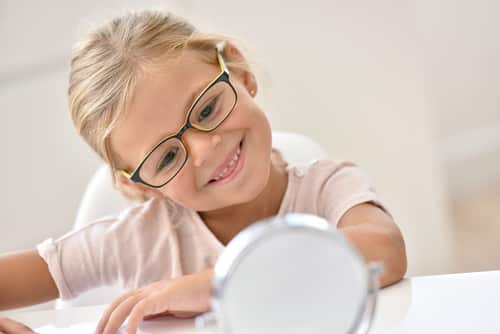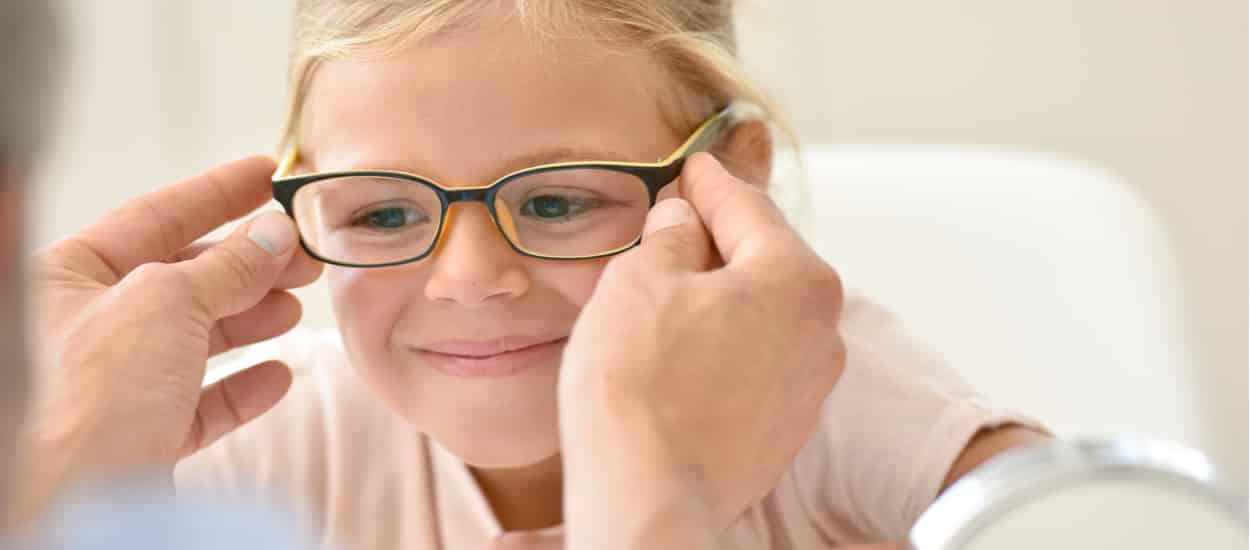Children’s Eye Health and Safety Month takes place in August. That’s when children have either filed back into the classroom or are in the thick of getting ready to do so. It’s a good time to think about their eyes, which are important learning tools.
During the first three years of school, children are learning to read. After that, they’re reading to learn. In other words: children are always using their eyes to learn.
Since learning is so very visual, the smart thing to do is to bring your child to an eye professional for regular eye examinations. This is the best way to ensure your child’s vision health. And when you ensure your child’s visual health, you’re doing a great deal to ensure your child’s academic success.

Sometimes, in fact, children are assumed to have learning disabilities when what they really have are vision problems. Regular eye exams followed by treatment for any problems that may crop up, avoid such mishaps. That’s important because if a child is trying hard in school and not succeeding, this can affect the child’s self-esteem, making the child feel stupid: incapable of doing the work.
If you’re bringing your child for yearly eye exams, you’re doing right by your child. But it’s important to note that eye problems can develop between yearly appointments. For that reason, it’s important to be on the lookout for behaviors and signs that indicate a child may be experiencing some sort of vision problem. If you note any of the following signs and behaviors, schedule an appointment with an eye professional.
Eye Appearance:
- Eyes not lining up properly—one eye turns in or out.
- Eyelids are red, crusty, or swollen
- Eyes are red or watery
Behavior:
- Rubbing eyes all the time
- Covers or closes an eye
- Tilts head to side or pushes head forward, especially when watching television
- Holds book too close or too far away
- Blinking often
- Becomes cranky when forced to do reading or other close work
- Squints or frowns
- Disinterest in reading or viewing distant objects
- Eyes tend to wander
Your Child Says:
- “My eyes itch”
- “My eyes are burning”
- “My eyes are on fire”
- “My eyes feel scratchy like something’s in them”
- “I can’t see that very well”
After Close Work
- “My head hurts”
- “I feel dizzy”
- “I feel sick in my stomach, nauseated”
- “Everything’s all blurry”
- “I’m seeing two of everything”
Eye Injury
Parents should also know what to do in case of an eye injury:
Scratched eye—a lightly scratched cornea tends to heal beautifully, with no complications, but a deep cut means you need to see a doctor right away. Your child will almost certainly need surgery.
Dust or sand in eyes—have the child blink repeatedly. If this doesn’t help, try washing the eye with a commercial eye-wash.
Chemical burn—should chemicals splash into your child’s eye, flush the eye with running water for 15 minutes and call the doctor to get advice.
Cut eyelid—cuts to the eyelid should be stitched by an eye doctor.
Blood in eye—blood in the eye means a trip to the emergency room.
Black eye—black eyes generally need no treatment at all.
Preventing Eye Injuries
- Staircases should have gates at top and bottom to protect very young children from falls
- Staircases should have handrails
- Household products containing dangerous chemicals should be locked away out of children’s reach
- Knives and other kitchen utensils along with work tools should be out of reach of children
- Children should wear sunglasses that have impact-resistant lenses and block 100 percent of UV rays when out of doors
- Children should view this month’s eclipse with solar-filtered eclipse glasses or by way of a special solar viewer
Eye Tips for High School and College Students
Students facing exams means eyes that are constantly challenged. Added to not getting nearly enough sleep, long hours of study and staring intently at a computer screen makes for tired, strained eyes. The student may notice his eyes feel dry, achy, or scratchy.
Using computers for hours on end tires the eyes because the user doesn’t blink as much as he would just reading a book. Blinking less often means reduced lubrication in the eyes, making them feel uncomfortably dry, tired, and scratchy. This is often referred to as “dry eye.” Some people develop dry eye not from being studious, but as a result of not producing enough tears to keep the eyes healthy and make them feel comfortable. The symptoms are the same: eyes that sting, burn, or feel scratchy.
Dry eyes tend to be more sensitive. That means that exposure to wind or smoke can cause the eyes to tear profusely. The good news is that whether your dry eyes are caused by study or by not having enough natural tears, an over-the-counter eye artificial tears preparation or lubricant should help.
20-20-20 Rule
Another eye problem in the making is staring at one thing for hours, namely, the computer. The eyes were not made for such lengthy focus on a single object. Solve this problem by taping a note to your screen reminding you to blink and look away from the computer toward something in the distance. Keep in mind the 20-20-20 rule: for every 20 minutes you’re on the computer, look at something at least 20 feet away for 20 seconds. This gives your eyes a nice break and helps them rest up.
Prolonged Contact Lens Use
Every contact lens wearer is warned not to leave the lenses in overnight. What most teens fail to realize is that studying for 18 or more hours straight while wearing contacts is about the same as sleeping in them. The older hydrogen lenses in particular, are a danger when worn for long periods since they don’t let oxygen through to the eye, when air is crucial to eye health.
Without enough oxygen, the cornea can become inflamed. This can lead to blurry vision. In the worst scenario, prolonged contact use can lead to eye infections and even corneal ulcers that can permanently damage the vision.
Some students, of course, fall asleep over their books while wearing contacts. The solution? Switch off and put on regular eyeglasses every few hours during lengthy study periods. If you’re the kind of kid who falls asleep whenever and wherever you are, you may want to purchase contact lenses made from silicon hydrogen, a material with increased oxygen permeability. This can at least reduce your risk of eye injury and discomfort.

Could your child have a vision problem masquerading as a learning disability?
Has your child seen an eye professional this year?
How did you know your child had a vision problem?
How do you get your child to wear his sunglasses?
